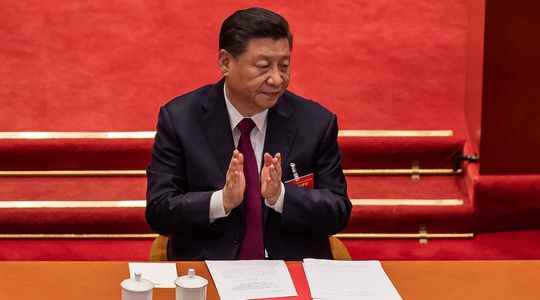This could not have come at a worse time for Xi Jinping. While the Chinese president trumpeted his total “victory” over the virus just two years ago, opposing a Western system on its knees and a communist system in battle order, here he is facing the most serious epidemic wave since the Wuhan lockdown.
Five months before the XX Communist Party Congress, when this health success was supposed to pave the way for a triumphant nomination for a third term, the total or partial confinement of more than 340 million people in China – and in particular in Shanghai – is tarnishing. his stature as the most powerful chairman since Mao Zedong. He will probably be reappointed, but may have to make more concessions than expected.
“Lack of food in China’s richest city, what a sad irony,” whispers a Shanghainese via encrypted messaging. intellectuals opposed to the regime during the cultural revolution”. According to several testimonies, even negative cases were sent to quarantine centers.
“This situation in Shanghai is unprecedented and is straining relations between the Communist Party and the masses it claims to represent, underlines Dan Macklin, an independent researcher, long affiliated with the Oxford University Center in Shanghai. By confining the economic capital, authorities have suppressed fundamental freedoms on an unprecedented scale, all for an objective of eliminating Covid that many citizens do not understand given the very low number of serious infections and deaths linked to the Omicron variant.
Shanghai had tried its own way
Shanghai has always been allergic to the control of the central power. The city remains the stronghold of a discreet but powerful opposition to Xi Jinping, embodied by former president Zhang Zemin and his lieutenants. Xi may have appointed Li Qiang as the head of the local Communist Party in 2017, but the latter has failed to fully take over the city.
“Shanghai’s political and legal apparatus has long escaped Xi Jinping’s control. For two years the police chiefs have changed but not those below, the subordinates, it is local police forces that do not do not show much zeal, which explains why Beijing had to send nearly 120,000 agents to Shanghai, including military police “to enforce the orders from above, explains Alex Payette, president of the Cercius Group, a Consulting firm in strategic intelligence and geopolitics based in Montreal.
Shanghai had been trying its own way outside Beijing’s strict “zero Covid” lockdowns, pursuing a more tolerant policy of containment that could have been seen as a pilot project for an eventual move towards “living with the virus.” virus”. But the experiment was abruptly interrupted and Vice Premier Sun Chunlan was dispatched to Shanghai to take over the city and form a sort of parallel government loyal to Xi. This affair also certainly marks the end of the career of Li Qiang, whom some already saw as the next Prime Minister.
“Ten years after coming to power, Xi Jinping is in a quagmire. As there is no longer anyone who dares to oppose him, he is sticking to his strategy as the economy collapses,” writes Jeremy Goldkorn, editor of the SupChina newsletter.
“Chinese power is a prisoner of its own propaganda,” adds Joerg Wuttke, president of the European Chamber of Commerce in Shanghai. In an interview with the Swiss newspaper The Market, he explains meeting “very well-informed and open-minded high-level politicians”, who “know what Covid zero means for the economy”. But “until the XX Party Congress, they will stick to the policy of zero Covid, he adds. President Xi wants to be confirmed for a third term, so he cannot change his speech so close to the finish line”.
The regime “prisoner of its own story”
This does not prevent squeaks within the regime. “The situation in Shanghai has become a pole around which the ‘discontented’ can gather. They will certainly use the Shanghai debacle to their advantage before the Congress”, warns Alex Payette. Who are these opponents? “Red princes” descendants of the heroes of the communist revolution – who feel marginalized -, reformers; and all those who have had to suffer from the purges carried out by Xi Jinping since he came to power.
“Xi punished 4.5 million Party cadres for corruption. This is unheard of since Mao. He took everyone by surprise and confiscated all powers. In the event of a political crisis, each clan will fight to gain the upper hand”, summarizes Edmond Shum, a former Chinese businessman who gravitated in the upper echelons of Chinese power, and is now exiled in Great Britain.
“In my experience, when things are really bad in China, the technocrats come in and do some reforms. Maybe there will be a rethink when the national economy hits rock bottom? But for At the moment, China is not getting out of the rut the president has put the country in. It is a prisoner of its own narrative. It is quite tragic: China was the first to enter the pandemic, and it is the last to come out,” concludes Joerg Wuttke, still in the Swiss press. “The Red Emperor” was very reckless, declaring victory too soon.
